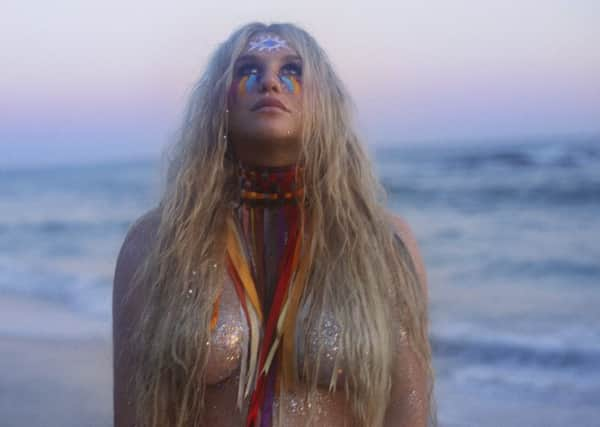Album reviews: Kesha | Paul Draper | David Rawlings | The Isley Brothers & Santana


POP
Kesha: Rainbow Kemosabe/RCA ***
Paul Draper: Spooky Action KScope ***
David Rawlings: Poor David’s Almanack Acony Records ***The Isley Brothers & Santana: Power of Peace
Legacy Recordings
JJJ
Kesha may be best known for her try-hard trashy pop but, like her sonic sister Miley Cyrus, she has collaborated with some of the mad, bad boys of rock’n’roll, including Iggy Pop and The Flaming Lips, and attempts to reflect her non-pop influences on her belated third album.
Advertisement
Hide AdAdvertisement
Hide AdThe Californian singer has been embroiled for the past few years in an increasingly nasty sexual harassment suit against her former producer and mentor Dr Luke and she’s in no mood to play nice on Rainbow, which opens with an acoustic country number delicately entitled Bastards.
Rainbow is full of statements – of defiance, independence, empowerment. She gets personal (in a general sort of way) on by-the-numbers pop ballad Praying, channels her inner Joan Jett on processed power rocker Let ‘Em Talk, one of two tracks on which she is joined by The Eagles of Death Metal, and takes a leaf out of the Beyoncé bible on the strident Woman, inspired by Trump’s “locker room talk” and enhanced by a blast of brass from the Dap-Kings’ horns.
Throughout her travails, Kesha has commanded a lot of support from some high profile entertainers. In her own strong-but-sweet way, the redoubtable Dolly Parton lends succour on a simple cover of her 1970s track Old Flames (Can’t Hold A Candle To You), originally written by Kesha’s mother Pebe Sebert, and Kesha actually sounds at her most natural and unforced on the country numbers Hunt You Down, with its stern warning about (in)fidelity, and Spaceship, on which our space cowgirl rides contentedly into the sunset.
Mansun are now a somewhat overlooked band of the Britpop diaspora, but the Chester four-piece were hugely successful and ardently followed in their day. Now former frontman Paul Draper kicks off his long-awaited solo debut in ridiculously overwrought style with Don’t Poke the Bear, whipping up Radiohead levels of melodrama. The source of all that pent-up angst is explicitly tackled in the tracks Jealousy Is a Powerful Emotion, bitter mantra You Don’t Really Know Someone Till You Fall Out With Them and the backstabbing references in the funk pop number Can’t Get Fairer Than That. Hopefully he feels better for the catharsis.
Poor David’s Almanack is the considerably more temperate latest offering from David Rawlings, undersung guitar ace and singing/songwriting partner of Gillian Welch, who adds her soothing harmonies to this compendium of original country songs. The results pale slightly in comparison with Welch’s immaculate catalogue but nevertheless the couple weave effortlessly between raw bluegrass, sparse country balladry and 60s-influenced country rock with honourable mentions going to the bluesy psychedelia-infused Cumberland Gap and Guitar Man and pitch black humorous fable Yup.
Two titans of 60s and 70s music, Carlos Santana and surviving Isley Brothers Ronald and Ernie, come together on Power of Peace without stretching themselves too far in their selection of material from the funk, soul and jazz canons of Stevie Wonder, Curtis Mayfield and Marvin Gaye among others.
The first half of the album favours Santana with his psychedelic blues licks, which are readily showcased on the somewhat slick freakout of Total Destruction to Your Mind, before the ensemble move into the jazz-soul territory most associated with the socially conscious Isleys for the likes of breathy psych soul number Let There Be Peace on Earth. Cindy Blackman Santana sings lead on the only original song I Remember, bringing a lighter bossa nova touch with rapturous falsetto colouring from the Isleys.
CLASSICAL
Advertisement
Hide AdAdvertisement
Hide AdDvorak Symphony No.9 From the New World/Sibelius Finlandia Signum ***
What would make you go out and buy yet another recording of Sibelius’ Finlandia and Dvorak’s “New World” Symphony? Is the curiosity factor enough in this case? That exists in the nature of the orchestra itself: the rather intriguing Chineke! Orchestra, funded by the Chineke Foundation, with a mission to provide career opportunities to young black and minority ethnic musicians in the UK and Europe. To be honest, the performances are fairly run-of-the-mill, although for the most part they are thoughtful, sweetly toned and faithful to the score. Conductor Kevin John Edusei keeps things simple and fluid, and exciting, too, at times. But at various points on this disc it’s hard to shake the feeling that there’s something missing. In the opening of Dvořák’s famous largo, for example, there are none of the tonal subtleties required to inject magic into the music. Similarly, the electricity required to light up the scherzo is lacking, and there’s not quite enough finesse and definition to elicit the true spirit of Sibelius’ Finlandia.
Ken Walton
JAZZ
Colin Steele Quartet: Diving for Pearls Marina Records ****
Colin Steele, a trumpeter renowned for distinctively Scots-accented compositions, turns his attention to the engagingly melodic compositions of David Scott of the Pearlfishers. He’s accompanied by established playing partner and arranger, pianist Dave Milligan, with superb interaction from bassist Calum Gourlay and drummer Alyn Cosker. From the opening Bluebells, they create a polished and warm-hearted piece of work, Steele playing mute trumpet throughout, articulating plaintively or with terse urgency over Milligan’s mercurial piano work. Vampires of Camelon waltzes smoothly before hotting up for a joyous crescendo, while the initially unhurried piano phrases of Ice Race similarly intensify over Cosker’s busy drumming.
There are distinct echoes of Bacharach, and tracks like the laconic melancholy of You’ll Never Steal My Spirit, sound particularly cinematic, while Umbrellas of Shibuya opens with Debussy-esque delicacy but builds beguiling intricacies, before things draw to a graceful close with the brief shimmer of Swan Dreams.
Jim Gilchrist